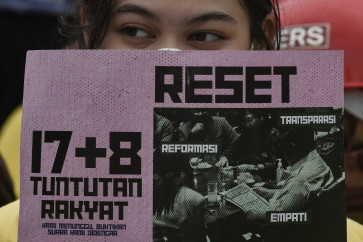Popular Reads
Top Results
Can't find what you're looking for?
View all search resultsPopular Reads
Top Results
Can't find what you're looking for?
View all search resultsRide-hailing giants beef up safety features for trust
As part of efforts to win consumer trust, ride-hailing archrivals Go-Jek and Grab flex their investments to reduce fraud and improve safety for both drivers and passengers
Change text size
Gift Premium Articles
to Anyone
A
s part of efforts to win consumer trust, ride-hailing archrivals Go-Jek and Grab flex their investments to reduce fraud and improve safety for both drivers and passengers.
Following recent media reports of the alleged rape of a Go-Massage masseuse by her customer, Go-Jek has announced that its latest app update would provide three new safety features for drivers and passengers.
Go-Jek global head of transport Raditya Wibowo said in Jakarta recently that the new features, which can be accessed by clicking a tiny shield icon on the bottom right of the app, were a safety handbook, a 24/7 emergency hotline and a share trip option.
The hotline, which is limited to Greater Jakarta, asks callers to verify their identity before dispatching a private security team, whereas the share trip option allows passengers to share a live-feed of their GPS location to trusted contacts.
“For victims, we meet up with them, process their cases, provide psychiatric and psychological support and even help them bring cases to a court of law,” said Go-Jek chief of corporate affairs Nila Marita.
Rival company Grab Indonesia launched similar safety features five months ago when the brand came under fire after mishandling a sexual harassment allegation.
Grab not only offers an emergency hotline and share trip option, but also makes drivers undergo a face-recognition lock before accepting a ride. The company heavily invests in safety, particularly driven by cofounder Tan Hooi Ling.
Both Go-Jek and Grab also said they would introduce sexual harassment awareness training for drivers. Go-Jek works with non-profit online-based initiative Hollaback!, while Grab works with the National Commission on Violence Against Women (Komnas Perempuan).
In regard to fraudulent orders, Grab announced recently that it had begun testing its fraud prevention service called Grab Defence on at least two Indonesian strategic partners — e-wallet OVO and online-to-offline platform Kudo — in order to generate cleaner revenues and grow consumer bases.
Grab head of user trust Wui Ngiap Foo told reporters in Jakarta that his company chose to begin tests in Indonesia because the country had the highest rate of loss due to fraud among the Southeast Asian countries.
“In Southeast Asia, an average 1.6 percent of e-commerce revenue is lost to fraud,” he said, “In Indonesia, that number doubles to 3.2 percent.”
Grab Defence is designed to minimize clients’ losses by allowing them to cross-check account information, such as phone numbers and emails with Grab’s own database to identify and avoid known problematic accounts, without revealing personal data.
Therefore, the service’s coverage is inherently limited to Grab’s market reach but enough for the company’s partners and merchants, who will be able to access the service by year-end.
Wui Ngiap Foo later told The Jakarta Post that Grab was also open to making Grab Defence a new revenue stream for the company, which is currently focused on food delivery.
“There are many multimillion dollar companies built on security and fraud prevention. We aren’t taking that lance right now but who knows what the future might bring,” he said.
Meanwhile, Go-Jek said last month in a statement that its latest artificial intelligence (AI) algorithm successfully led to the arrest of four fraudulent drivers in Jakarta.
Teguh Arifiyadi, head of investigations at the Communications and Information Ministry, said the ministry welcomed such private sector efforts in taking down online fraud.
However, he pointed out that ride-hailing fraud was heavily under-reported whereby it constituted less than one percent of the 2,600 fraud reports received by the ministry last year — the bulk are related to e-commerce platforms.
“Firstly, these are small monetary loses, people aren’t bothered to report them. Secondly, Indonesians are quick to forgive and forget,” he said.
As a final note, Teguh stressed the fact that safety and security was a non-stop process and thus both Grab and Go-Jek had to be proactive in updating both their fraud prevention and safety features.










